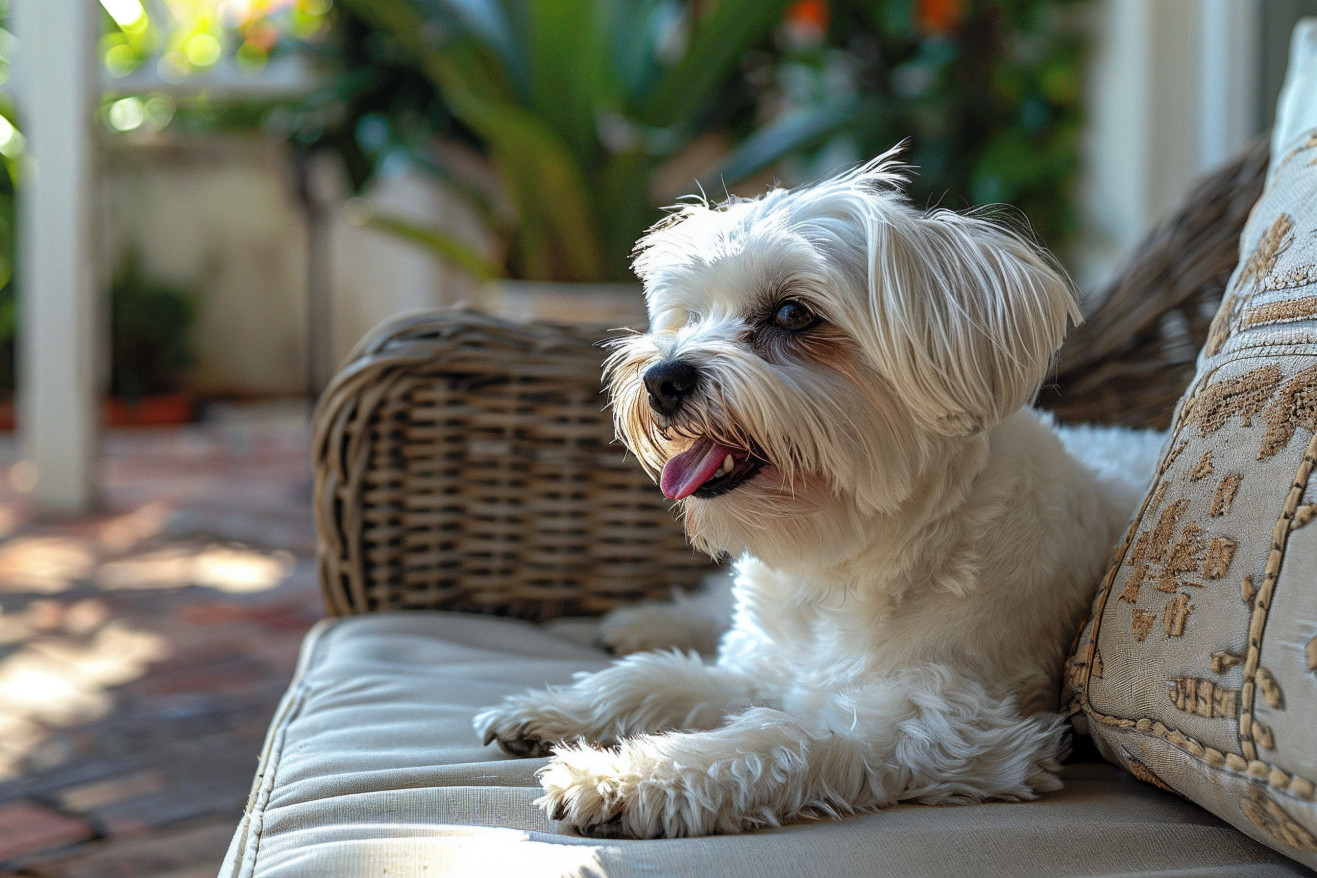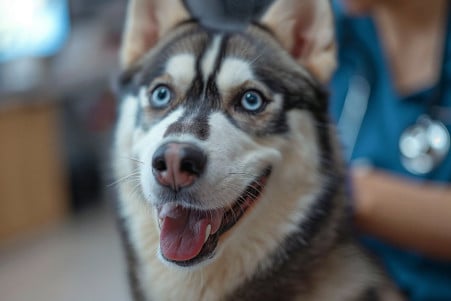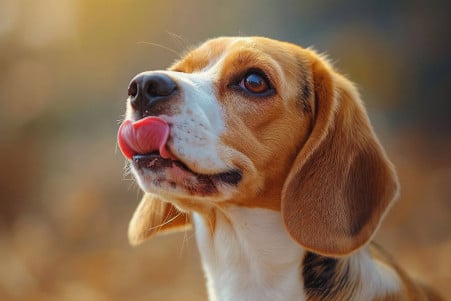Why Does My Dog Keep Licking His Lips and Swallowing? Decoding Canine Behavior
24 February 2024 • Updated 24 February 2024

If your dog is constantly licking his lips and swallowing, you might be wondering if it’s just a funny quirk or if there’s something else going on. While it’s not always a cause for alarm, excessive lip-licking and swallowing in dogs can be a sign of several health problems, including nausea, dental issues, stress, and even having something stuck in their mouth.
Pay attention to any other symptoms that may be happening at the same time and see a vet if the behavior doesn’t go away.
To help you better understand why your dog might be licking his lips and swallowing so much, we’ve combed through a variety of veterinary and animal behavior studies.
We’ll delve into everything from common health problems to neurological disorders, stress responses, and even diet-related factors that could be contributing to your dog’s behavior. Our goal is to give you the information you need to better understand the potential reasons behind your furry friend’s strange actions.
Why does my dog keep licking his lips and swallowing?
What Health Issues Could Be Causing Your Dog to Lick Their Lips?
While it may seem like a harmless habit, excessive lip licking and swallowing in dogs could be a sign of an underlying health issue. Dental problems, for example, can cause these behaviors. In particular, swelling under the tongue or along the jawline could be a sign of periodontal disease, and if your dog is licking and swallowing a lot, it’s important to make sure that dental issues are not the cause, according to Cuteness.
Gastrointestinal (GI) issues are another common cause. Many different GI problems, including gastroenteritis and pancreatitis, can cause pain, which can lead to licking and swallowing as a way to try and alleviate the discomfort, according to Hill’s Pet. Signs of these issues can include loose stools, diarrhea, or vomiting, all of which should be checked out by a vet.
The same symptoms can also be caused by foreign objects in the mouth or nausea, which can be caused by esophagitis, according to the Washington Street Humane Society. To diagnose these issues, vets will often use tests like bloodwork or imaging.
Regardless of the cause, if your dog is exhibiting these behaviors for longer than 24 hours, it’s important to take them to the vet. Not only will this help ensure that they get the care they need, but it can also help prevent complications like dehydration or malnutrition that can occur if these issues persist.
Part of being a good pet owner is paying attention to these signs and making sure that you get your pet help as soon as possible.
The complexity of these symptoms can sometimes make it difficult to determine if they are being caused by underlying health issues or neurological or behavioral problems, which can also cause these symptoms. It’s important to consider all of these factors to make sure that you’re taking a comprehensive approach to your dog’s health.
Getting to the Bottom of It: Neurological and Behavioral Causes of Canine Lip Licking and Swallowing
While medical issues are often to blame for a dog’s lip-licking and swallowing, it’s important to consider neurological and behavioral causes that can have similar symptoms.
Complex neurological conditions like Canine Degenerative Myelopathy and Intervertebral Disc Disease can cause nerve damage that leads to odd behaviors like constant licking and swallowing, according to Physio Vet. Other symptoms like mobility issues and problems with the coordination of the hind legs can also be signs of neurological conditions.
On the behavioral side, anxiety and Canine Compulsive Disorder (CCD) are both examples of conditions that can cause repetitive lip-licking. According to PetMD, these conditions are similar to cognitive dysfunctions in humans and require a treatment plan that’s tailored to the individual dog. A vet will need to perform a thorough exam to diagnose these conditions, which may include brain scans and blood work to rule out other medical issues.
The sooner these conditions are diagnosed and treated, the better the outcome will be. Treatment may include medications, changes in diet, and prescription diets that are formulated to help dogs with cognitive issues, as mentioned by PetMD. In addition, behavioral therapy can help dogs learn to cope with these symptoms and lead them to better responses to their triggers, which can improve their quality of life.
What It Means When Dogs Lick and Swallow Due to Stress
Dogs are known to communicate through body language, and stress is one of the many emotions that can be conveyed in this way.
According to Earth Buddy, one of the ways that dogs show they are stressed is by licking, chewing, or swallowing more than usual.
While these behaviors are normal, especially in stressful situations, like when a dog is in a new place or around loud noises, they can also be a sign of stress or anxiety. Whole Dog Journal also says that stress can cause changes in a dog’s eating habits, as well as vomiting, diarrhea, and other displacement behaviors, like excessive paw licking.
The situations that dogs are in are also a major factor in their stress levels. According to VCA Animal Hospitals, dogs can be stressed by a variety of things, including changes in their daily routine, separation from their owners, and even just being in an overstimulating environment. To help reduce stress, it’s important to make sure that dogs are in a stable, safe environment, get regular exercise, and have a consistent routine.
If you’re unable to help your dog manage their stress, it may be time to seek professional help. If your dog is showing signs of chronic stress, you can work with a certified dog behaviorist to come up with a plan that’s tailored to your dog’s needs. By recognizing and addressing your dog’s stress, you can help them be a calmer, happier pet, which can lead to a healthier life, including better eating habits.
Diet and Environment in Canine Lip Licking and Swallowing
The relationship between diet, environment, and behavior in dogs can be seen in lip-licking and swallowing. Studies have shown that a dog’s diet and environment can affect the way that it behaves, including the way that it shows signs of stress, such as lip licking. While food allergies and sensitivities are less common, they can lead to gastrointestinal distress, which can cause these behaviors.
Changing a dog’s diet to remove potential allergens or switching to a hypoallergenic diet, as suggested by a vet, can help alleviate these issues and reduce these behaviors.
As shown in a pilot study in Animals, environmental enrichment can also help improve a dog’s quality of life and reduce stress-related behaviors.
By providing a variety of enrichment options, owners can help their dogs get to a place where they are less stressed and show fewer signs of stress. If you think that your dog’s issues are related to diet, it’s important to talk to a vet, who can help you make the healthiest changes to your dog’s diet based on their specific needs.
Balancing the dietary and environmental sides of your dog’s life can help reduce stress-related behaviors and make sure that your home is a happy one.
What Your Dog’s Lip-Licking and Swallowing Could Mean: A Recap
Throughout our investigation, we have found that a dog’s lip-licking and swallowing can be caused by a variety of medical, environmental, and psychological issues. From dental disease and gastrointestinal problems to neurological disorders and anxiety, there are many reasons why a dog may exhibit these behaviors. While the latter two are less common, they can be treated if caught early.
It’s important to know the difference between normal behavior and behavior that’s a cause for concern, and this can often be determined by the context in which your dog is licking its lips and swallowing. If your dog is showing signs of stress and anxiety due to its environment, it will require special attention and possibly the help of a behaviorist.
It’s also important to remember that diet can be a major factor, and a change in diet can help relieve symptoms that are caused by allergies or sensitivities.
As dog owners, it’s important that we stay on top of our dog’s health and well-being. If you’re ever worried about your dog’s behavior, we recommend that you consult a veterinarian to ensure that your dog is getting the best care and quality of life possible.
This investigation has shown the importance of understanding the complexities of dog behavior and health and has highlighted the special bond and responsibility that we have to our pets.


